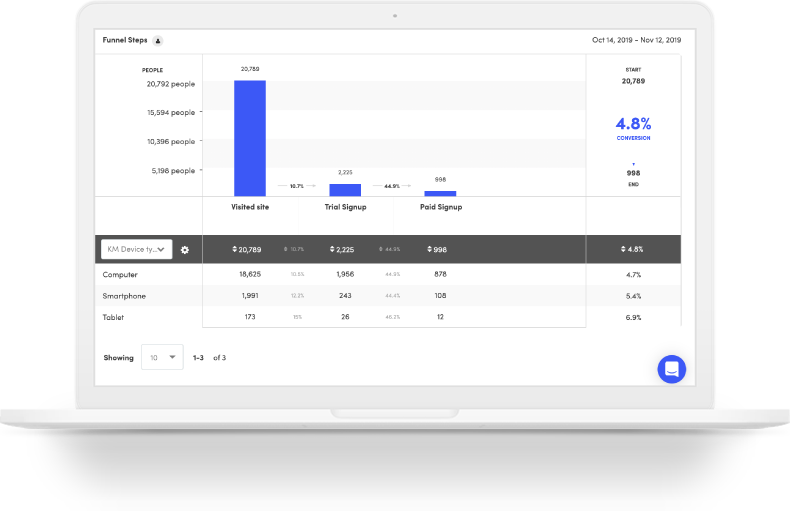
15 Important Ecommerce Tools You Need to Know in 2025
If you’ve been reading my blog for a long time, you know that I love to talk about tools. After all, marketing is a race, and everyone needs some advantages over the competition. Even without stiff competition, everyone wants to maximize their return on investment – and effort. Tools let you achieve your sales and marketing goals more easily, both by helping you target efforts and automate highly repetitive tasks.
However, tools aren’t just for marketers. They’re also essential for people who own an ecommerce business. Many of the pressures are the same as for marketers. For instance, you want people to discover your website, so SEO is critical. Likewise, you need a website that runs efficiently enough that visitors will stay and buy things.
Next, you need to keep customers coming back. Otherwise, you’ll continually look for new customers to replace the ones you’ve lost. While some customer turnover is inevitable, you want the churn to be minimal so you can make better profits.
Finally, as an ecommerce business owner, you’re responsible for marketing your business. Whether you hire outside help or do it yourself, there’s more to marketing than SEO. Instead, people need to understand why your products are superior, or why you’re the better store to work with (such as through better service).
With that in mind, let’s look at some of the best available ecommerce tools.
5 Important Types of Ecommerce Tools
While there are many types of ecommerce tools to help you sell and manage your products, like inventory management, internal collaboration tasks, social media dashboards, etc., that are not covered in this post, these are why these five important types of ecommerce tools are the ones you should be focusing on:
Ecommerce Website Platforms
This becomes the website for your online business, so choose carefully! Each platform works a little bit differently, even though they all can host your website and handle customer payments. Therefore, you need to think about the features you need to run your ecommerce business efficiently. For instance, the number and type of products you sell can influence your choice. Similarly, you might want a platform that allows for more customization, or that can accommodate a blog.
Remember, whichever platform you choose will display everything on your website. Plus, you’ll be updating it relatively easily. To that end, you want something that you find easy to use and update. Then, you’ll want a great experience for customers. Websites that are difficult for customers to navigate often drive customers away.
Email Marketing Tools
Email marketing is critical for the success of your ecommerce marketing, so once again, choose which technology you use carefully! And don’t forget about the potential for SMS marketing! From transactional emails with tracking information to the email campaign for the holidays, email marketing should be central to your ecommerce marketing operations!
Think you can handle all those emails with a free email address or with simple automation from your store email address alone? You’d be wrong. Free email boxes work hard to keep people from using personal addresses for email marketing. It’s a defense against spam, which nobody except the spammers like. You might get booted and your account shut down. This would be a disaster for any everyday operations you’re running through that address, such as procurement or customer service.
If you want more information about email marketing and why email software should be among your ecommerce tools, I have another post on that topic.
Affiliate & Customer Loyalty Marketing Tools
A great way to expand your ecommerce efforts is to leverage influencers, whether they be affiliates or your own customers! If you’re like most other ecommerce businesses, you have trouble retaining customers sometimes. Loyalty programs help you with customer retention, not only by rewarding repeated business but by making people feel great about their buying decisions. They might even share with friends who need products that you sell, especially if it’s a specialty item.
Website Analytics Tools
How well is your website performing? And what can you do to improve your conversions and the customer journey for your potential customers in general? Site analytics answer these questions and more, but you need to know how to use them properly. The data is relatively easy to gather with the right ecommerce tools, but you must analyze them properly. I always suggest you choose something that helps you draw actionable insights from your numbers.
SEO & Research Tools
Whether it is for your blog to generate more traffic as part of your content marketing or to understand the potential on Amazon better, you need to do your research! SEO tools help you tailor your site to do better on search engines, but you need the right keywords first. Also, you’ll need some research tools that can help you pick the best products. For instance, you might find that people want something, but it’s hard to find. That becomes an opportunity to make money.
With all this in mind, let’s look at the different ecommerce tools available for shop owners.
Further Reading: The Ultimate Guide to SEO for eCommerce Websites
Ecommerce Website Platforms
Before you can even set up your site, you’ll need one of these platforms. It’s possible to set up a small site with WordPress or something similar, but if you carry a wider variety of products, you’ll need a specialty content management system.
1. Shopify

Shopify is a drag-and-drop ecommerce site platform, so you can easily run it even if you don’t know much about web design. You can choose some themes and add your branding. Through native functionality and add-on apps, Shopify handles ordering, shipping, payments, and product descriptions.
Also, you aren’t limited to just selling through your website. Shopify lets you sell on social media with mobile apps, pop-up shops, and even bricks-and-mortar. The last functionality means that you can use Shopify to run the online version of your physical location. With more local businesses than ever selling online, this platform is an option to consider.
By the way, they’ll also host your site, which gives you one less thing to worry about.
Trying to Keep Up with Digital Marketing?
Just released: my new book to help small businesses, entrepreneurs, and marketers master digital marketing in today’s digital-first world.
Drawing on my Fractional CMO experience, Digital Threads simplifies complex strategies into clear, actionable steps for success.
Transform your business today—grab your copy! Click the cover or button below to buy on Amazon.
Further Reading: Shopify SEO Checklist: 11+ SEO Tasks to Increase Store Sales without Paid Ads
2. WooCommerce

Love WordPress? Then you’ll probably like WooCommerce, too. That’s because WooCommerce is basically WordPress for online selling – and it’s open-source, too. This also means you don’t have to pay for a WooCommerce account, either. On the other hand, you’ll need to buy hosting. Not everything can be free!
What about the features, though? You get all the basics, such as drag-and-drop, code-free web development. You also get some ecommerce tools for marketing, such as placing ads. Want to list on Amazon? That’s also built-in, so you only need the seller account on Amazon.
Finally, WooCommerce works through a plugin model, just like its blogging counterpart. Add payment options, email marketing, analytics, and more. You can even add a blog through WordPress integration.
3. Wix

Similarly to WooCommerce, Wix has a little bit of everything. Build your website without code, and they’ll host it. Market your business, add your payment processing options, shipping/order fulfillment, and even in-person point of sale. You can even link the ecommerce tools with your “general” Wix site, allowing for blogs and other content marketing.
Further Reading: 30 Most Important Ecommerce KPIs to Track for Growth: Essential Metrics for Success
4. Squarespace

Squarespace also has both ecommerce and general website types, so it’s a multipurpose website platform. Users talk about how easy it is to make a great-looking website, so it’s popular with creative businesses. In addition, Squarespace has ecommerce tools that work especially well for service businesses, such as online scheduling.
For the more traditional ecommerce businesses, Squarespace has a lot of tools that help you manage the business. For instance, beyond the standard payment portals and inventory keeping, you can add a shipping label function. This interfaces with major shipping providers and lets you choose the best way to ship something to a given recipient. Then, you can print out the shipping label and get the package on its way. Finally, there are some in-person sales functionalities if appropriate for your business.
5. BigCommerce

If you’re a B2B seller, you need to check this one out. That’s because BigCommerce has functionalities that are specially designed to accommodate B2B companies and industries. Additionally, this platform has more room for growth than many other options: even bigger businesses use it. Overall, the calling card of BigCommerce is that it’s extremely flexible. You can customize your website and its features to support a complex business model – or a simple one.
Further Reading: 13 Ways to Use AI in Ecommerce in 2025 (with Tools Recommendations)
Email Marketing Tools
Email marketing is necessary even for the smallest ecommerce businesses because it helps build relationships with your customers and leads. Plus, you’ll need email ecommerce tools to send transactional emails and shipping notices because an individual mailbox can’t handle this volume. Let’s look at some of my favorites.
6. Klaviyo

These days, people spend a lot of time on their smartphones, and it goes everywhere with them. However, many businesses don’t have the ecommerce tools to leverage this trend effectively. However, Klaviyo helps bridge the gap with SMS marketing functionality. In other words, they won’t just try to reach people through email and targeted ads. They’ll send promotional text messages, too. Many customers love this approach as long as they don’t get too many from the same sender.
Another advanced feature of Klaviyo is the high level of personalization. While most email tools do segmentation, Klaviyo takes it further by recommending products based on quiz answers. In other words, it works based on customer inputs and not just by passively tracking their behavior. That makes it especially effective for ecommerce businesses with a younger consumer base.
Further Reading: 15 Killer Amazon Seller Tools
7. ActiveCampaign

Active Campaign will give you all the basics and much more. The standout feature of this email marketing app is that it’s much more than that: it’s a whole suite of ecommerce tools. That’s because, in addition to triggered email campaigns, analytics, and segmentation, you also get a CRM. For this reason, you can input customer data just once, and then you have it in a centralized location for multiple processing operations.
If you aren’t clear on what I mean, that’s not surprising. Most beginning businesses don’t have a good CRM yet, because they have few customers and don’t do a lot of marketing. However, the CRM is a database of customer information that sales and marketing professionals update continually. In other words, it’s an all-in-one sales and marketing tool.
Further Reading: Ecommerce Analytics: Key Metrics, Top Tools, Case Studies and Best Practices
8. Omnisend

Omnisend is a versatile email and SMS marketing platform tailored for micro, small, and medium-sized ecommerce businesses. Omnisend excels in helping you engage your audience through email and SMS marketing, catering to the growing trend of mobile device usage.
One of Omnisend’s key features is its user-friendly interface, making it easy for businesses to create email campaigns, design signup forms, and access comprehensive sales and performance reports. Whether you’re a beginner or seasoned marketer, Omnisend’s intuitive tools make email and SMS marketing accessible. Even more, its 24/7 email and live chat support is free for anyone, on any plan, including on the free plan.
Affiliate & Customer Loyalty Marketing Tools
As I mentioned above, customer loyalty is very important, especially if you’re starting out. But beyond customer loyalty, engaging affiliate marketers to help sell your products is very effective. In this case, you compensate affiliate marketers for generating sales. You can do this as a percentage of the sale or a per-customer fee. Consider offering a special discount for people who use the referral link, as that sweetens the deal.
9. ReferralCandy

This app offers your customers compensation or an incentive for making referrals. They get a referral link to post on social media, use email, and more. You can choose the kind of incentive. A classic option is “refer a friend, we’ll give them a $10 bucks discount, and you get $10 store credit.” Or any other amount, for that matter. You can also pay a referral fee or commission. One thing I love about ReferralCandy is that, unlike some other ecommerce tools, you only pay them for success.
10. Smile.io

Smile has referral marketing functions. But what makes this tool different is that you can build a loyalty program with it. For instance, you can have people accumulate points that they can use for a discount or free gift. The points can be earned by buying products, making referrals, or even posting on social media. Likewise, you can implement a tiered VIP program, as you see at many of the big retailers.
Who says you have to be a big ecommerce site to get creative?
Website Analytics Tools
All growing websites gather an analyze site analytics. These can encompass almost any performance indicator, from site visits to conversion rates, and even customer demographics. Once you have these numbers, you can turn them into actionable insights to help you grow your business.
Further Reading: 5 Ways to Leverage Social Media Analytics for Your Business
11. Google Analytics

Anyone with a website that Google indexes can use this, and it’s completely free for site owners. All you have to do is add the module or code to your website’s tech stack. If you are on most platforms, this only takes a few clicks, so it’s really easy.
Data-wise, you get all the basics, such as audience demographics and site visit information. Then, you can use some other ecommerce tools, like your ecommerce CMS and marketing suite, to analyze the data. Best of all, this tool grows with your website because it’s designed for sites of all sizes.
12. Hotjar

Do you ever wonder what people look at on your website? Besides tracking what they put in their cart, and what pages they visit, it’s sometimes hard to tell. Fortunately, Hotjar is here to help. This is one of the few ecommerce tools that lets you see exactly where people are looking, even if they don’t click on anything. Hotjar does this with heat maps, which track where customers’ eyes travel on your page. The tool also tracks and analyzes consumer behavior. Then, you can use these insights to boost your sales.
13. Kissmetrics

Another tool for behavioral analytics is Kissmetrics. While the literature doesn’t mention heat maps, you do get detailed information about what customers do on your website. Better yet, the information is tied to a specific user, not just a bunch of session IDs (which are anonymous). Best of all, Kissmetrics lets you track user behavior across site versions and your mobile app. In other words, if the same person views your site on a desktop, their phone, a tablet, and the app, you will see the total picture for that individual.
Further Reading: 20 Definitive Ecommerce Marketing Strategies to Implement in 2025
SEO & Research Tools
Search Engine Optimization is one of the most important aspects of running a successful website. After all, people don’t just come if you build it. You need to attract users through search engine results. Luckily, these ecommerce tools will let you reach those goals more easily.
14. Semrush

Semrush is one of those ecommerce tools that does a bit of everything, and does them well. For one thing, they have everything you need for successful SEO operations, including keyword research and data on how other sites are staying at the top of page 1. You also get detailed competitive analysis from everywhere across the web, so nobody can easily sneak up on you from behind.
Want an all-in-one tool that also helps you with paid advertising functions? Semrush delivers here, too. As your business grows, you can use this app for a huge range of functions to leave the competition in a pile of dust.
15. Jungle Scout

Jungle Scout is a competitive analysis tool for Amazon sellers. It’s also useful for larger businesses that have items sold on Amazon, but don’t do it themselves (think a computer manufacturer, for instance). Use it to find out what your competition is doing, then hone in on opportunities you wouldn’t have seen otherwise. You can even use this tool to craft product descriptions, track inventory, and more. Depending on your business model, this could be the main tool for an FBA seller.
Further Reading: The 5 Most Powerful Ecommerce Digital Marketing Strategies
Conclusion
Running an ecommerce business can be very rewarding. However, it’s also very competitive, with a lot of companies pursuing the same customers. Furthermore, SEO and social media marketing present significant challenges, especially for new businesses. It’s easy to get overwhelmed and just as easy to fail. Fortunately, with the right ecommerce tools you’ll find your business much easier to run – and more successful.








